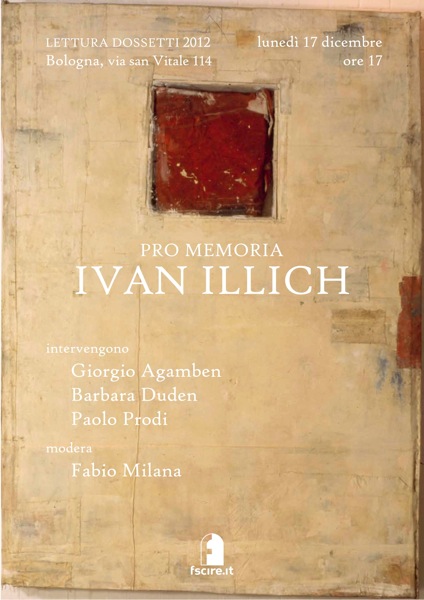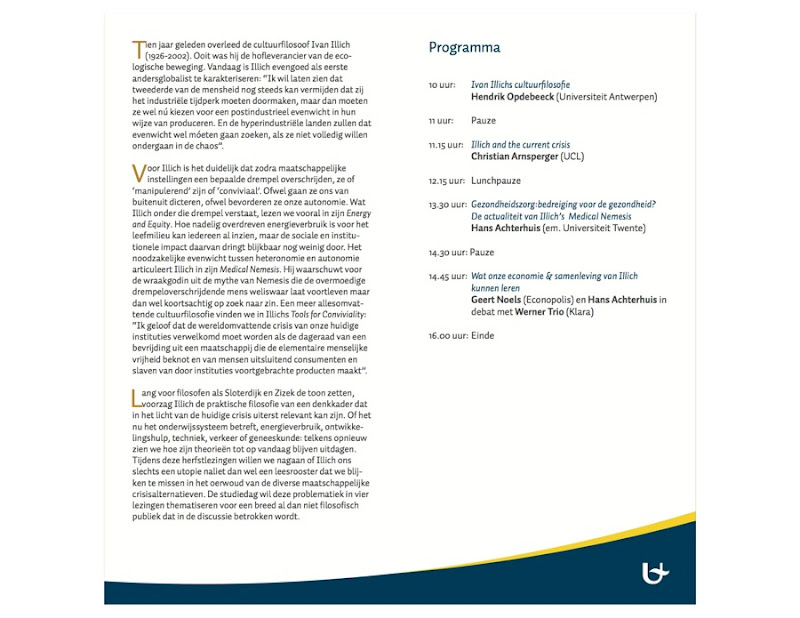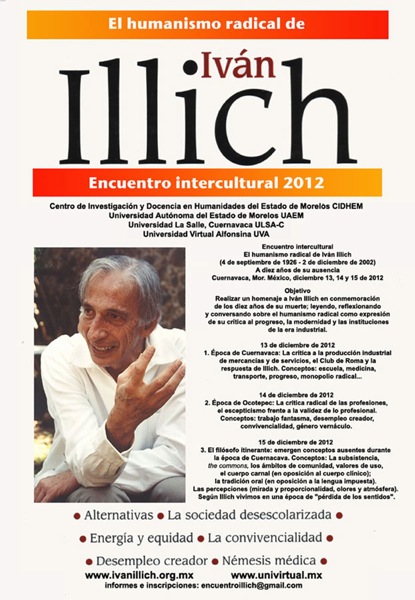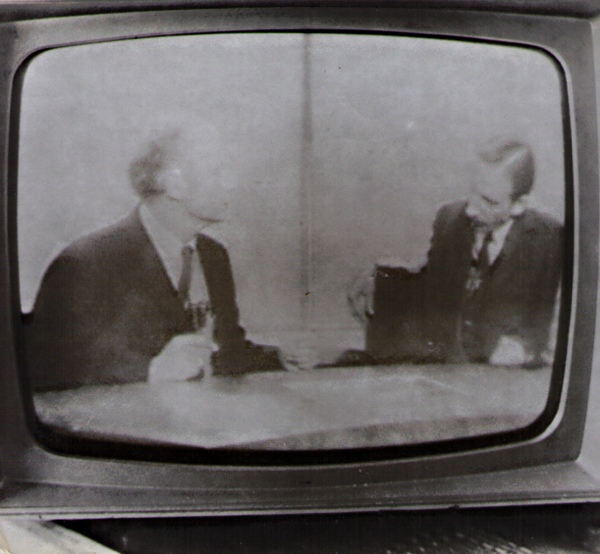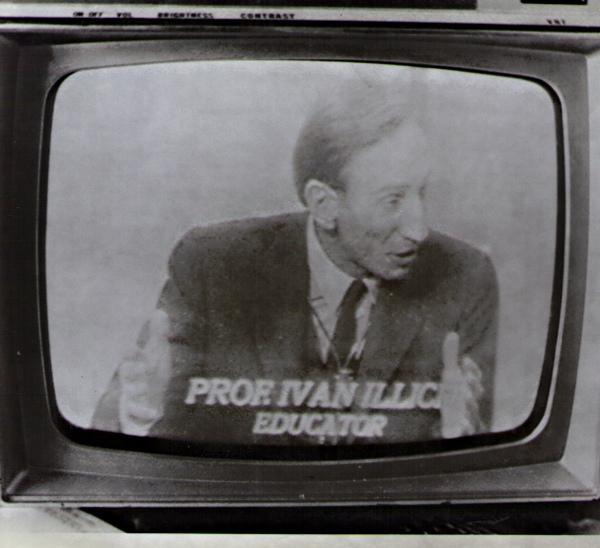In 1973, with his book Tools for Conviviality about to be published, Ivan Illich spoke to an audience at Newman Hall Holy Spirit Parish, which is the Catholic community at the University of California's Berkeley campus. For all we know, this was the first time Illich publicly sketched out his notion of conviviality and its contrast with growth-oriented, consumer-focused industrial society. As part of this effort, he offered some compelling thoughts about education and deschooling, thoughts that shine revealing light on what we've long taken to be a widespread misunderstanding of his argument in Deschooling.
A recording of this talk was broadcast on KPFA, San Francisco's Pacifica station (listener-sponsored and renowned for its radical politics), and a recording of that broadcast recently came into our possession. Here is our transcription of the last few minutes of the broadcast, with Illich wrapping up his answer to a question from the audience:
… Let's recognize what schools really do. Now, all over the world, schools school. I never forget when I first realized what this means, with a group of Black Power leaders in Chicago three years ago, and suddenly somebody said to me, 'You know, yeah, you're right, schools are made to school you.' And I understood that schools are made to school you, and everybody laughed when in the afternoon they showed up with buttons saying 'School you.'
You cannot go to school for a year without learning at least one thing: that the society as it is considers that it would be better that you had gone on for the second or the third year. Therefore, the people who drop out -- the concept of drop out is also a beautiful one -- who drop out of the school system are already deeply schooled. They're schooled today into inferiority. You cannot have a pyramidal class education system no matter who gets up there - if he gets up there because his parents are rich, or he is particularly gifted, or because he's particularly in favor with the ideology which prevails - without teaching many more people that they are inferior.
So, one question is, How can we accept joyfully, even though somewhat with fright, the breakdown of the legitimacy of this particular ritual on which our society, growth society, has been relying on for a few generations?
The second question, which goes much deeper, is, Is education a legitimate enterprise, public education? Is it necessary that we live in a society in which you cannot become a citizen until you first have consumed a non-tangible product of an institution where other people have cooked up for you a program by which you will be educated?
This question is deeply connected with the origins of the concept of education. Until the Reformation, people were born in sin until baptized. They were born lacking something - they couldn't become citizens unless they had gone through a ritual which provided them that something.
Now, I'm personally, hopefully, a very traditional Catholic and I have no difficulty whatsoever with the concept of original sin, and grace, and baptism, and sacraments, and what have you. But the form which this took in the 14th, 15th, 16th and 17th century was, you couldn't be a member of society, of civil society - in Spain, for instance - unless you were baptized.
This goes very much further. The treatment mentality then developed, the idea that there were institutions that would treat people into being as they have to be in order to fit into the society which we construct for them.
I thought … John McKnight showed me the transcript of a speech which a … pediatrician gave at a big meeting of the medical association in Chicago, in which he called on his colleagues to remember that children are born patients until certified healthy by the doctor.
Now, it is not only through school that people's inborn deficiencies as citizens can be remedied. We could invent, during the next 10 years, other methods of channeling an intangible commodity called education in varying degrees to different people according to their needs.
I ask, at this moment, with this paper, … I'm trying to ask a more radical question: Ought we not to call a desirable society one so designed - so transparent, so simple - that most people, most of the time, have access to most of the facts and policies and tools which shape their lives? If universal education means anything, it means that most people most of the time know what's going on around them. … It's pretty logical.
And we have used school, or education, as the means which makes it possible for society to develop tools and institutions to which most people have no access by saying they have all universal education and they know how to read and write, and then, they find it difficult even to teach them that.
As we see it, that second to last paragraph expresses an important refinement of Illich's deschooling argument that unfortunately is widely overlooked or ignored. Here, in fact, is the bridge between Deschooling and Tools for Conviviality, a key thought for understanding both books. Consider:
Deschooling is not a particularly easy book to read. It is dense and its rhetorical style takes some getting used to. And this, we believe, is one reason many readers come away from the book with the incorrect idea that Illich was just another school reformer, albeit more radical than most. Just make schools more "humane" or more "free," these readers understand him to be saying, or just find the right set of educational technologies, and all will be well. Schooling can be made more efficient in its ability to reach and "educate" more people more effectively. All that's needed is more research and perhaps some rethinking of grades, homework, or teacher training. This interpretation also informs many efforts and much thinking in the homeschooling and unschooling movements, many of whose parent-practitioners make no bones about their aim to outperform the "failing" public schools and supercharge their children's education, often with an eye on helping those children get into better universities and thereby earn more money as adults.
The most explicit and most egregious expressions of this shallow reading and the wishful thinking it encourages can be seen on the many websites that trumpet Illich's idea of "learning webs" as an endorsement of - and justification for - Web-based schools and computer-based instruction. Using technology to re-energize schooling as we know it is widely discussed, of course, among reformers such as Bill Gates and among a growing raft of technology entrepreneurs who are enjoying serious attention from Silicon Valley venture capitalists and other investors. Educational publishers have their own plans for harnessing computers for schooling, too. The push to privatize public schools is based largely on the idea that teaching can be done more effectively, and more profitably, were more classroom time turned over to computers.
But Illich never sought merely to reform public schooling. He argued for nothing less than its inversion - and an inversion of society as a whole, no less. A truly convivial society would be one in which there'd be no need for the traditional schooling and educational system that he dissects so skillfully in Deschooling. And by the same token, the deschooling measures that he describes, such as the fostering of "learning webs," could not take hold in the kind of industrial society we live in today, rooted deeply in what Illich called "knowledge capitalism."
Another way to put it is that the schooling system as we know it today leads to the destructive, anti-convivial society we're stuck with. And likewise, industrial society must have, and will always fight to maintain, the schooling system and essential arrangement (based on the assumption that knowledge is scarce and best provided by specially trained teachers) that it currently has. One begets the other, each needs and reinforces the other.
Convivial society, as we understand it, would, through political discussion and action, set limits on tools such that the kind of intensive training and constant re-training that we now take for granted would not be necessary. A convivial society, as Illich put it in his talk at the Newman Center, would be one in which "most people, most of the time, [would have] have access to most of the facts and policies and tools which shape their lives." Tools would be simple enough that the knowledge needed to use them and repair them would be widely available, not confined to scarce and costly schools and training classes. As it is, most producers of tools today depend on selling training courses for a major portion of their profits. Know-how is purposely kept scarce, both by limiting it through systems of certification and by continuously changing -- aka "enhancing" -- products in ways that require users of those tools to pay for periodic retraining.
The bicycle is perhaps the ideal example of a convivial tool. No individual's use of a bike infringes on anyone else's use of a bike; it's difficult to clog the roads with enough bicycles to cause a "traffic jam" of the crippling kind that often arises when too many cars show up in the same place. The bike, moreover, is a machine whose workings most people are able to understand simply by looking at it, and it's one that most people also can fix by themselves. And if they can't or don't want to bother fixing their bike, many others can do it for them precisely because knowledge about the machine and its workings is widespread; it's not scarce, in other words, as is the know-how needed to work on many modern car engines, for instance. (Indeed, many car makers, today, design their engines and other components such that only those with special training and with access to specialized wrenches and other tools can repair those engines. Scarcity is artificially imposed for the sake of extra profit.)
Unfortunately, most of those who proclaim their enthusiasm for Deschooling Society seem not to have even heard of Tools for Conviviality, much less read the book and understood how its argument relates to and extends that of the earlier book. One result is an endless stream of rhetoric about moving schools online and even the occasional dropping of Illich's name as justification for some techno-education project or another. Which is, in our book, a shame.
Illich criticized the school system as essentially an attempt to "funnel" students through a rigorous, near-industrial process of education. Year after year, school subjects them to pre-fabricated lessons taught by professionally trained and quite anonymous teachers. There's no room or regard for any student's particular interest or curiosity at any given moment, students are forced to consume what's served to them when it's served. Illich also criticized the notion, made explicit in certain engravings from the past, that education can be understood as a matter of pouring knowledge through a funnel lodged in the student's cranium.
The third paragraph of his book's introduction reads:
Universal education through schooling is not feasible. It would be no more feasible if it were attempted by means of alternative institutions built on the style of present schools. Neither new attitudes of teachers toward their pupils nor the proliferation of educational hardware or software (in classroom or bedroom), nor finally the attempt to expand the pedagogue's responsibility until it engulfs his pupils' lifetimes will deliver universal education. The current search for new educational funnels must be reversed into the search for their institutional inverse: educational webs which heighten the opportunity for each one to transform each moment of his living into one of learning, sharing, and caring. We hope to contribute concepts needed by those who conduct such counterfoil research on education--and also to those who seek alternatives to other established service industries.[emphasis in original]
The sixth chapter of the book is titled "Learning Webs," and it puts forth an alternative to the idea of school as "a pyramid of classified packages accessible only to those who carry the proper tags." That alternative Illich describes using the terms "network" and "opportunity web." But he is careful to qualify his choice of words.
The essential idea underlying this chapter, as we understand it, is that people (and therefore society as a whole) would be better off if they were able to learn from each other as peers, or friends, free to engage with each other as and when they chose, not as student and teacher compelled by law or custom to sit together in a certain room at a certain hour each day. And to help out, Illich says, a simple matching service could be set up to help those who'd like to learn or teach certain skills or who would enjoy discussing a particular topic or book, for instance, to find each other. Illich briefly mentions the idea of using a computer to run such a "peer-matching" service, but he comes nowhere near suggesting that the computer itself be used as an educational tool or teaching medium.
In fact, the learning webs that Illich proposed could be - and indeed, have been - implemented using only a telephone or bulletin board and a box of 3x5 file cards.
Illich actually expresses a certain reluctance in using the term network:
I will use the words "opportunity web" for "network" to designate specific ways to provide access to each of four sets of resources ["things, models, peers, and elders"]. "Network" is often used, unfortunately, to designate the channels reserved to material selected by others for indoctrination, instruction, and entertainment. But it can also be used for the telephone or the postal service, which are primarily accessible to individuals who want to send messages to one another. I wish we had another word to designate such reticular structures for mutual access, a word less evocative of entrapment, less degraded by current usage and more suggestive of the fact that any such arrangement includes legal, organizational, and technical aspects. Not having found such a term, I will try to redeem the one which is available, using it as a synonym of "educational web."
Naturally, today's technology enthusiasts have latched on to this last phrase, some of them even crediting Illich explicitly for supposedly envisioning, if not "inventing," the World Wide Web as we know it, in principle, at least. Illich reportedly scoffed at this.
For the record, Illich describes four kinds of "learning web." In his words:
1. Reference Services to Educational Objects -- which facilitate access to things or processes used for formal learning. Some of these things can be reserved for this purpose, stored in libraries, rental agencies, laboratories, and showrooms like museums and theaters; others can be in daily use in factories, airports, or on farms, but made available to students as apprentices or on off hours.
2. Skill Exchanges -- which permit persons to list their skills, the conditions under which they are willing to serve as models for others who want to learn these skills, and the addresses at which they can be reached.
3. Peer-Matching -- a communications network which permits persons to describe the learning activity in which they wish to engage, in the hope of finding a partner for the inquiry.
4. Reference Services to Educators-at-Large -- who can be listed in a directory giving the addresses and self-descriptions of professionals, paraprofessionals, and free-lancers, along with conditions of access to their services. Such educators, as we will see, could be chosen by polling or consulting their former clients.
Compared to what it is today, the computer was a crude device when Illich was writing about education. Illich suggested it be used only as a sophisticated file-card matching system, we are quite sure, not as a machine facilitating "live" communications or "long-distance learning," as so many educational-Web enthusiasts yearn to implement.
In fact, the main technology Illich suggests using is the tape recorder - low-cost, easy to use, and able to convey lessons of all kinds:
What are needed are new networks, readily available to the public and designed to spread equal opportunity for learning and teaching.
To give an example: The same level of technology is used in TV and in tape recorders. All Latin-American countries now have introduced TV: in Bolivia the government has financed a TV station, which was built six years ago, and there are no more than seven thousand TV sets for four million citizens. The money now tied up in TV installations throughout Latin America could have provided every fifth adult with a tape recorder. In addition, the money would have sufficed to provide an almost unlimited library of prerecorded tapes, with outlets even in remote villages, as well as an ample supply of empty tapes.
This network of tape recorders, of course, would be radically different from the present network of TV. It would provide opportunity for free expression: literate and illiterate alike could record, preserve, disseminate, and repeat their opinions. The present investment in TV, instead, provides bureaucrats, whether politicians or educators, with the power to sprinkle the continent with institutionally produced programs which they-or their sponsors--decide are good for or in demand by the people.
Technology is available to develop either independence and learning or bureaucracy and teaching.
Clearly, today's Web is a technology that's doing both, helping individuals to share knowledge with each other, often for the love of it, and serving as a platform for the delivery of all kinds of commercially-packaged lessons and "educational resources" including even live, one-on-one tutoring for hard-pressed schoolchildren. Look on YouTube, for instance, and you can learn from others about everything from how to play guitar to fixing your own computer to playing soccer. At the same time, however, established educational institutions are scrambling to harness the Web as a low-cost means of conducting classes for credit. Illich, we suspect, would applaud the former while seeing the latter as a prime example of what he warned his Newman Center audience about 30 years ago, namely newly-invented "methods of channeling an intangible commodity called education in varying degrees to different people according to their needs" as a way to "remedy people's inborn deficiencies as citizens."




